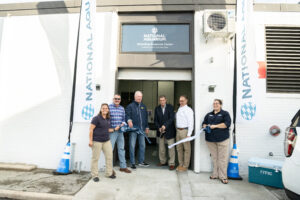
OCEAN CITY – Officials last week celebrated the opening of a new stranding response center in Ocean City.
Last Friday, city officials and representatives with the National Aquarium gathered at the Ocean City Municipal Complex at 65th Street to dedicate the aquarium’s new stranding response center. The 400-square-foot space, dedicated to long-time volunteers Chuck and Ellen Erbe, will allow National Aquarium staff and volunteers to quickly respond to reports of stranded animals on nearby beaches.
“We are grateful to Mayor Rick Meehan and his staff for making it possible to locate our new National Aquarium Stranding Response Center in the heart of Ocean City,” said National Aquarium President and CEO John Racanelli. “This specially outfitted space will allow our Animal Rescue team to stabilize and begin treatment of stranded seals and sea turtles immediately, without the long drive to Baltimore. We’re honored to dedicate the new center to our beloved volunteers Chuck and Ellen Erbe.”
As the organization responsible for responding to stranded marine mammals and sea turtles along the 3,000-plus miles of Maryland coast, National Aquarium Animal Rescue relies on staff and a network of volunteers to respond to reports of stranded animals throughout the region, sometimes up to 175 miles from the aquarium’s Baltimore campus. Kate Shaffer, the aquarium’s stranding response and triage manager, said the distance from Baltimore to area beaches made response particularly challenging.
“Over the years it became more and more obvious that doing stranding response was challenging for us because most animals were stranding here in the Ocean City and Assateague area, along the Atlantic coast,” she explained. “We came to a point where we said we either need to do this a lot better or we need to let someone else do this portion of the operation.”
Following a lengthy strategic planning process, Shaffer said the National Aquarium opted to open a triage center in Ocean City. Shaffer, who served as the aquarium’s on-site rehabilitation manager, relocated from Baltimore to become the first, permanent Ocean City-based staff member.
“Stranding response was a big part of what our program does, and we didn’t want to let it go. We wanted to commit to doing it better,” she said. “For us, that meant having a full-time presence here along the Atlantic coast.”
Shaffer said the new triage and treatment center will allow for faster response times, which could mean the difference between life and death for stranded animals. Before making a three-hour trip to Baltimore, animals in critical condition can be treated as soon as possible from the stranding response center.
“One of the issues is the extreme distance,” she said. “When an animal is critical and in need of rehabilitation, it usually needs immediate care. To be able to provide that locally was an important part of our plan for the future operation of our program.”
The new center features a treatment space equipped with a “garage door” style entrance to facilitate moving animals in and out with ease, as well as a small office space which will serve as a home base for Shaffer and a dedicated corps of volunteers. While animals requiring long-term care will still be transported back to Baltimore, the space will allow staff to assess and stabilize critical animals, buying valuable time when providing critical care.
“The town actually offered us this space,” Shaffer said. “We funded all the renovations to make it what we needed, but they are providing us a no-cost lease to reside here for the next five years.”
Shaffer said the new center will allow the National Aquarium and its roughly 65 volunteers to continue its mission of rescuing and protecting animals found on area beaches, including grey, harbor and harp seals, loggerhead, Kemps ridley and green sea turtles, and sometimes whales and dolphins. Officials say seals are likely to benefit most from the new stranding response center.
“We’re really excited to be part of the community down here and excited for this partnership with the town,” Shaffer said. “We hope it can benefit both the animals in the area, as well as the mission of our organization.”
The stranding response center is dedicated in honor of animal rescue volunteers Chuck Erbe and his late wife, Ellen, who began volunteering with the Aquarium’s Animal Rescue team in 2007 and donated countless hours to the care and wellbeing of animals rescued and released by the program. National Aquarium Animal Rescue has released more than 350 rehabilitated animals since its inception in 1991.
Over the course of more than 15 years, the Erbes, of Frankford, Del., in their roles as animal rescue first responders, often met the call when animals in distress were spotted – sometimes in the middle of the night or in foul weather – and aquarium staff 150 miles away needed their help. For many years, they carried the aquarium’s coastal operations, undertaking everything from reports of late-night whale spottings to turtle transport trips to Florida.
“They were down here when we didn’t have anyone down here, so they really carried response for us for many years and were extremely dedicated to the program …,” Shaffer said. “We hope it honors their service to our program for many years to come.”

